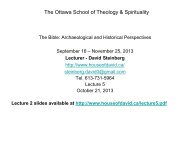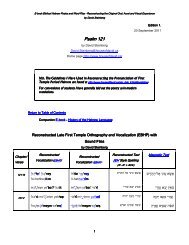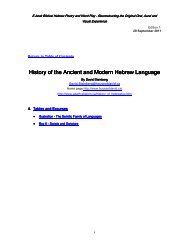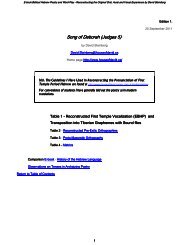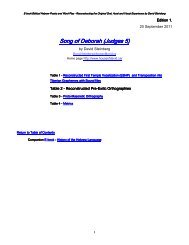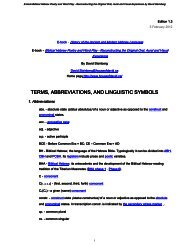Biblical Hebrew Poetry - House of David Steinberg
Biblical Hebrew Poetry - House of David Steinberg
Biblical Hebrew Poetry - House of David Steinberg
Create successful ePaper yourself
Turn your PDF publications into a flip-book with our unique Google optimized e-Paper software.
16<br />
E-book<br />
<strong>Biblical</strong> <strong>Hebrew</strong> <strong>Poetry</strong> and Word Play - Reconstructing the Original Oral, Aural and Visual Experience by <strong>David</strong> <strong>Steinberg</strong><br />
N.b.<br />
closed); yaˈšinu (yåˈšēn) י ֹ ָשֵ ן ><br />
"sleeping"; yaˈguru "being afraid"). This compensatory יָגוֹר ><br />
lengthening did not take place during the dropping <strong>of</strong> the final short vowels from the status<br />
constructus and verbs, and since during its operation these word classes already exhibited<br />
closed final syllables, they were not lengthened at all שָ מַר ;דַּג ־:therefore) "he kept", with final<br />
short vowels, viz, pataḥ. Since the ṣere and ḥolem in יָשֵ ן "he slept" and יָגוֹר "he was afraid"<br />
correspond to pataḥ, they have to be considered short as well, whereas the same words<br />
when serving as participles contain long ṣere and ḥolem; similarly<br />
.( מֻבְ דָּ ל qţl/yqţl against the participle יֻבְדַּל /הֻבְדַּל ,נִשְ מָר participle<br />
qţl as against the נִשְ מַר<br />
1. In the case <strong>of</strong> a verbal form being used as a name the stressed vowel undergoes compensatory<br />
lengthening 38 . E.g.<br />
(/EBHP/): /yi cˈqub<br />
qub/ "he over reaches etc."; /yi cˈqoːb/ "Jacob" both derived from BHA phase 2<br />
/ya cˈqu<br />
qubu/<br />
(/EBHP/): /naˈtan<br />
tan/ "he gave"; /naˈta<br />
taːn/ "Nathan" both derived from BHA phase 2 /naˈta<br />
tana/<br />
2. In some cases, if the preceding syllable was closed or when open contained an unchangeable long,<br />
vowel, /a/ remained short though in similar situations /u/ lengthened to /oː/ and /i/ to /eː/. Egs.<br />
PH */ʾiṣˈba<br />
c u/ > /EBHP/ /ʾiṣˈba<br />
c / 'finger', PH */šuːˈšanu/ > /EBHP/ /šuːˈšan<br />
an/ 'lily', PH */mapˈti<br />
tiḥu/ ><br />
/EBHP/ /mapˈte<br />
teːḥ/ 'key', PH */ša:ˈpi<br />
piṭu/ > /EBHP/ /šoːˈpe<br />
peːṭ / 'judge', PH */ṣipˈpu<br />
puru/ > /EBHP/ /ṣipˈpo<br />
poːr/ 'bird',<br />
PH */'mu<br />
'mutu/ > /EBHP/ */ˈmo<br />
moːt/ 'man'. However, in many cases, the EBHP form assimilated to the /da'ba:r<br />
'ba:r/<br />
class, i.e. the stressed /a/ lengthened to /a/. Egs. PH */miqˈda<br />
dašu/ > /EBHP/ /miqˈda:<br />
da:š/ 'sanctuary', PH */ c a:ˈ<br />
lamu/ > /EBHP/ / c oːˈla:m<br />
la:m/ 'world, age'. 39<br />
Table 1 - Changes in the Noun from PH to TH - General Case<br />
*PH<br />
EBHP<br />
PTH<br />
TH<br />
(c. 1200 BCE)<br />
*/EBHP/<br />
/EBHP/+<br />
*/PTH/<br />
*[PTH]<br />
/TH/ + *[TH]<br />
*[EBHP]<br />
(c. 400 CE)<br />
(c. 850 CE)<br />
(c. 850-550 550 BCE)<br />
דָּ בָברָברָברָ ר<br />
דבר דבר<br />
'word'<br />
*/daˈbaru/ 40<br />
*/daˈbaːr/<br />
s. */daˈbara/ 41<br />
*/daːˈbaːr/<br />
*[dɐˈbaːɾ]<br />
*/daˈbari/ 42<br />
*/dabaˈrāmi/<br />
du. 43<br />
*/dabaˈraym/<br />
*/dabaˈraymi/ 44<br />
*/dabaˈrūma/ */dabaˈrīm/<br />
pl.<br />
*/dəbaːˈrīm/<br />
*/dabaˈrīma/ 45 *[dɐbɐˈɾiːm]<br />
/dåˈbår/<br />
*[dɔːˈvɔːr]<br />
י ים רִ םִ<br />
דְּ בָ<br />
/dəbåˈrim/<br />
*[dəvɔːˈriːm]



